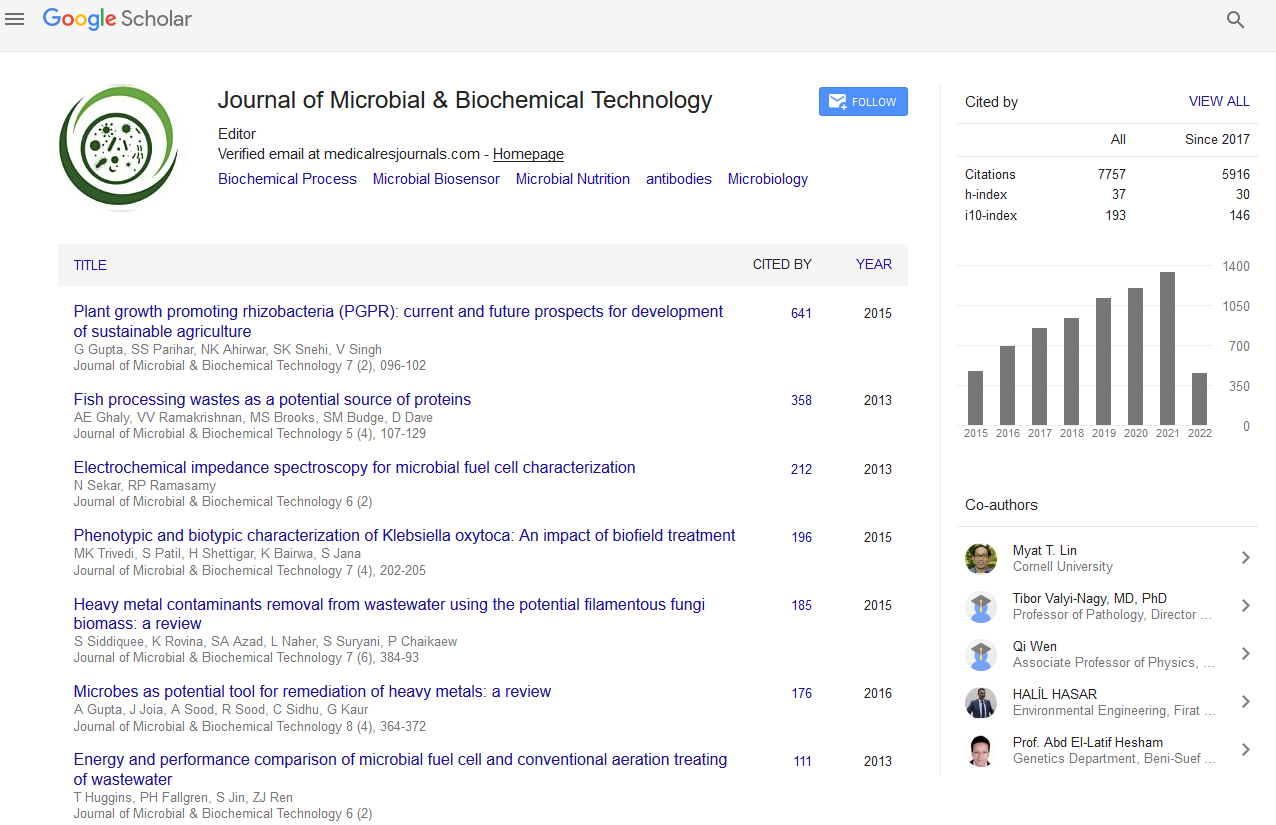PMC/PubMed Indexed Articles
Indexed In
- Academic Journals Database
- Genamics JournalSeek
- Academic Keys
- JournalTOCs
- China National Knowledge Infrastructure (CNKI)
- Scimago
- Access to Global Online Research in Agriculture (AGORA)
- Electronic Journals Library
- RefSeek
- Directory of Research Journal Indexing (DRJI)
- Hamdard University
- EBSCO A-Z
- OCLC- WorldCat
- SWB online catalog
- Virtual Library of Biology (vifabio)
- Publons
- MIAR
- University Grants Commission
- Geneva Foundation for Medical Education and Research
- Euro Pub
- Google Scholar
Useful Links
Share This Page
Journal Flyer

Open Access Journals
- Agri and Aquaculture
- Biochemistry
- Bioinformatics & Systems Biology
- Business & Management
- Chemistry
- Clinical Sciences
- Engineering
- Food & Nutrition
- General Science
- Genetics & Molecular Biology
- Immunology & Microbiology
- Medical Sciences
- Neuroscience & Psychology
- Nursing & Health Care
- Pharmaceutical Sciences
Detection of pathogens by polymerase chain reaction: Comparison with bacteriological water testing kit and standard methods for water quality monitoring
International Conference and Expo on Water Microbiology & Novel Technologies
July 18-19, 2016 Chicago, USA
Parampal Sahota and Gulab Pandove
Punjab Agricultural University, India
Posters & Accepted Abstracts: J Microb Biochem Technol
Abstract:
A defined substrate media as bacteriological water testing kit (BWTK) has been developed to detect the presence/absence of total coliforms, fecal coliforms, Aeromonas hydrophila, Yersinia enterocolitica and Listeria spp., from drinking water. A total of 10,000 drinking water samples from municipal corporation supply, submersible pumps and hand pumps were analyzed by both methods, BIS 10500:1991 and BWTK, at 5% level of significance no difference was observed. Microbiological and physicochemical analysis of 4000 drinking water samples from gastroenteritis prone areas of three different utilities. In contaminated drinking water samples, Aeromonashydrophila 78.94%, Yersinia enterocolitica 69.61% and Listeria spp., 52.63% were observed. All the isolates were further characterized biochemically and at molecular level by using species specific primers. On the basis of nucleotide homology 16S rRNA gene and phylogenetic analysis, the isolate of Aeromonas hydrophila (GP1), Yersinia enterocolitica (GP2) and Listeria spp. (GP3) were submitted to NCBI, USA with an accession number GU596499, GU596500 and JF798637 respectively. It was found that occurrence of emerging pathogens are independent of occurrence of fecal coliforms, E. coli in water. All the isolates from water showed MAR indices >0.2. Mineral analysis revealed that concentration of Pb, Cu, Fe, Cr, K, Na, Co and Ca in drinking water samples, analyzed were much below the permissible limits, Ni detected in 57.14% of samples. Growth kinetic of E. coli, Aeromonas hydrophila, Yersinia enterocoitica and Listeria spp., in microcosm of water drawn from tap, millipore filter, mineral water, tap water with biofilm and under psychrophilic conditions (4 ºC) revealed E. coli as short lived whereas Y. enterocolitica adapted better to all the environmental conditions. A combined culture, BWTK and multiplex polymerase chain reaction (PCR) a molecular tool, as water testing kit has been designed for simultaneous detection of Yersinia enterocolitica, Aeromonas hydrophila and E. coli in drinking water. The optimized conditions for multiplex PCR water testing kit are: Annealing temperature 57 ºC, Mg2+ concentration 3.0 mM, concentration of primer pairs of E. coli, Aeromonas hydrophila and Yersinia enterocolitica are 0.166 μM, 0.333 μM and 0.416 μM, respectively. In vivo study revealed that these emerging pathogens produced histopathological changes in liver, lung, heart, intestine and kidney. A biochemical kit for specific detection of emerging pathogens has been developed. Highest MIC of Sodium hypochlorite (4%) required by Yersinia enterocolitica (20 ppm) followed by Listeria spp., (10 ppm), Aeromonas hydrophila (6 ppm), E. coli (6 ppm) and contact time of 30 minutes. TEM analysis of water samples revealed presence of virus like particle of varying size 18-1726.72 nm.
Biography :
Email: parampal@pau.edu


